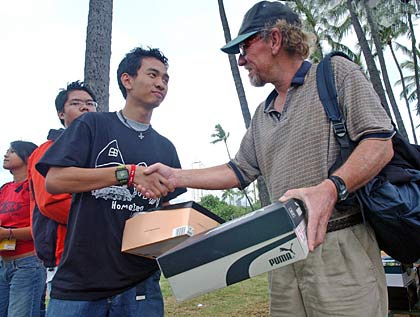
|
30 die homeless
each year
Honolulu joins in a
national observance
of a hazardous plight
Tim Cook has been robbed eight times, beaten up five times and suffered four staph infections since he went from home remodeler to homeless two years ago.
"It's been utter, complete despair," said Cook, 50. "You're completely at the mercy of other people."
Five of Cook's friends have died homeless, including one who had a stroke two weeks ago. Their stories and cries, though, are rarely heard.
For the first time, Honolulu joined cities across the country Tuesday in remembering the thousands who died homeless in 2004. A record 125 cities -- 25 more than last year -- are holding events this week to observe National Homeless Persons' Memorial Day.
"The memorial day is a way to make sure no one's life goes unnoticed," said Michael Stoops, of the Washington-based National Coalition of Homeless.
The homeless coalition estimates there are more than 3.5 million homeless Americans nationwide. An estimated 3,000 died last year, and the homeless coalition expects that figure to rise this year. The No. 1 cause of death was natural causes, followed by homicide, suicide and hypothermia, Stoops said.
Stoops began the annual remembrance in 1990, choosing Dec. 21, the first day of winter and the longest night of the year.
"Americans are good and decent people. Nobody wants people to live or die homeless. I think we've just become accustomed to it," he said.
There are about 6,000 homeless people in Hawaii, and about 30 die every year in Honolulu alone, according to the Affordable Housing and Homeless Alliance.
As the sun set, about 20 students from Moanalua High School gathered in Ala Moana Beach Park. The teens passed out bottled water and shoe boxes filled with toilet paper, toothbrushes, soap and shampoo that they had bought or collected.
The experience changed the perspective that Felipe Ojastro had about homeless people and was "better than getting Christmas presents."
"We're seeing a soft side to them," said Ojastro, 16, a junior. "Just their faces after seeing the box, it really means a lot to us."
There are many reasons people become homeless, including job loss, mental illness, divorce and skyrocketing housing prices.
"If you don't bring home a paycheck in our society, that could be you out on the streets, and that's why I think we pretend they're not there," Stoops said.
Cook, who became homeless after he fell into severe depression from his wife's suicide, just recently began collecting about $500 a month in Social Security benefits. But it is still not enough to pay for food or rent.
Thomas Tadeles, 59, said he works part time and earns near the minimum wage of $6.25 but cannot afford his own place. The father of five has been homeless since 1996 after "going broke" from a heart bypass surgery.
Stoops said about 42 percent of homeless across the nation are employed.
In most cities, when the bodies of homeless go unclaimed, their remains are cremated, put in a nondescript box and placed on a shelf or in a cabinet. Stoops said there are about 20 boxes inside the Washington, D.C., shelter where he helps out.
"It's a constant reminder of the urgency, from Hawaii to Washington, D.C.," he said. "Everybody thinks sheltering people is a nice, friendly kind of thing, but it's really a life-and-death issue to a lot of people."
www.nationalhomeless.org
[News] [Business] [Features] [Sports] [Editorial] [Do It Electric!]
[Classified Ads] [Search] [Subscribe] [Info] [Letter to Editor]
[Feedback]
